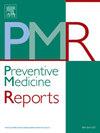中国中老年人慢性呼吸系统疾病与烹饪燃料类型的关系评估:来自居住区域和自我护理能力的见解
IF 2.4
3区 医学
Q2 PUBLIC, ENVIRONMENTAL & OCCUPATIONAL HEALTH
引用次数: 0
摘要
目的探讨45岁及以上成人清洁与固体烹饪燃料与慢性呼吸系统疾病(CRD)的关系,重点研究城乡位置和自理能力(独立、部分独立或依赖)的调节作用。方法利用2020年中国健康与退休纵向研究的横断面数据,运用logistic回归分析烹饪燃料类型与CRD的关系,同时探讨居住区域和自我护理能力的调节作用。进行稳健性检查以确认研究结果。结果清洁烹饪燃料的使用与所有人群中较低的CRD患病率有关。虽然城市居民的CRD基线风险较高,但清洁燃料与CRD之间的关系在城市和农村地区都是相似的。无论燃料类型如何,自我保健能力较差的个体都有较高的CRD风险,这表明仅靠清洁燃料可能无法完全减轻这一群体的健康风险。清洁烹饪燃料与城市和农村人群中较低的CRD患病率有关,其保护作用在这些人群中是相似的。较差的自我护理能力与较高的CRD风险相关,强调除了燃料转换之外的干预措施对于自我护理能力有限的脆弱个体是必要的。这些发现强调需要制定全面的公共卫生战略。本文章由计算机程序翻译,如有差异,请以英文原文为准。
Assessing the Association of Cooking Fuel Type on chronic respiratory diseases among middle-aged and older adults in China: Insights from residential area and self-care capability
Objective
This study aimed to evaluate the association between clean versus solid cooking fuels and chronic respiratory diseases (CRD) in adults aged 45 and older, focusing on the moderating effects of urban-rural location and self-care ability (independent, partially independent, or dependent).
Methods
Using cross-sectional data from the 2020 China Health and Retirement Longitudinal Study, logistic regression was applied to examine the relationship between cooking fuel types and CRD, while exploring the moderating effects of residential area and self-care ability. Robustness checks were conducted to confirm the findings.
Results
The use of clean cooking fuels was linked to lower CRD prevalence across all groups. While urban residents had a higher baseline CRD risk, the relationship between clean fuels and CRD was similar in both urban and rural areas. Individuals with poorer self-care abilities had a higher CRD risk, regardless of fuel type, indicating that clean fuels alone may not fully mitigate health risks for this group.
Conclusions
Clean cooking fuels are linked to lower CRD prevalence in both urban and rural populations, and their protective effect is similar across these groups. Poorer self-care ability is associated with higher CRD risk, highlighting that interventions beyond fuel switching are necessary for vulnerable individuals with limited self-care abilities. These findings underscore the need for comprehensive public health strategies.
求助全文
通过发布文献求助,成功后即可免费获取论文全文。
去求助
来源期刊

Preventive Medicine Reports
Medicine-Public Health, Environmental and Occupational Health
CiteScore
3.90
自引率
0.00%
发文量
353
 求助内容:
求助内容: 应助结果提醒方式:
应助结果提醒方式:


